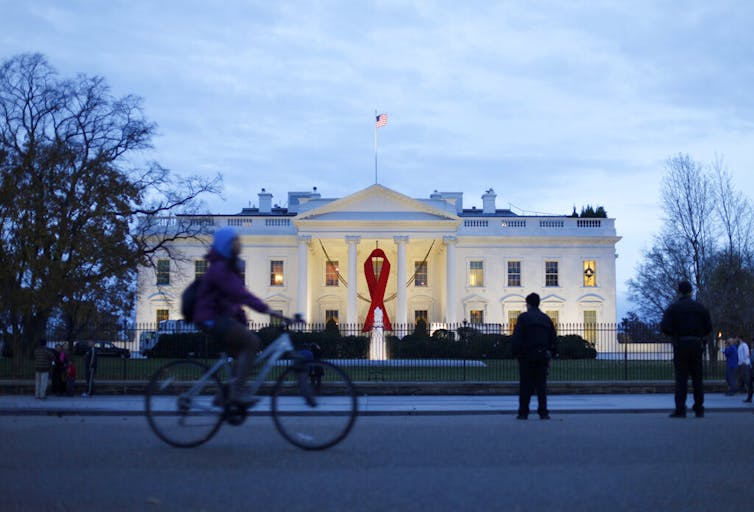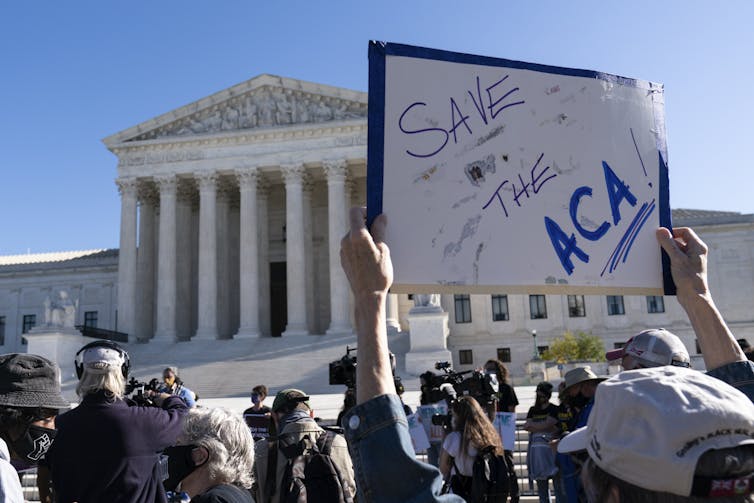Preventive care may no longer be free in 2026 because of HIV stigma − unless the Trump administratio
After a group of employers refused to provide their employees access to free HIV prevention treatment, the Supreme Court may decide whether insurers are required to fully cover preventive care.

Many Americans were relieved when the Supreme Court left the Affordable Care Act in place following the law’s third major legal challenge in June 2021. This decision permitted widely supported policies to continue, such as ensuring health coverage regardless of preexisting conditions, allowing coverage for dependents up to age 26 on their parents’ plan, and removing annual and lifetime benefit limits.
But millions are still at risk of losing access to lifesaving medicine and preventive services, following the Supreme Court’s decision to hear another case – Robert F. Kennedy, Jr. v. Braidwood – that has been working its way through lower courts for several years.
Interestingly, the Trump administration has chosen to build upon the same argument the Biden administration used to defend the law.
HIV stigma and preventive care
The case the Supreme Court is scheduled to hear in April 2025 was filed by Braidwood Management, a Christian for-profit corporation owned by Steven Hotze, a Texas physician and Republican activist who has previously filed multiple lawsuits against the Affordable Care Act.
Braidwood and its co-plaintiffs, a group of conservative Christian employers, objected to providing their 70 employees free access to preexposure prophylaxis, or PrEP, a medicine that prevents HIV infection. Hotze claimed that PrEP “facilitates and encourages homosexual behavior, intravenous drug use and sexual activity outside of marriage between one man and one woman,” without citing scientific evidence to support this. He and his plaintiffs argue that religious beliefs prevent them from providing PrEP under their insurance plans.
Since the HIV/AIDS epidemic began in the 1980s, the disease has been politicized and stigmatized. Because it had predominantly affected men who had sex with men, AIDS was initially called gay-related immune deficiency, making people reluctant to be associated with the disease. It was only after a teenage boy from Indiana named Ryan White contracted HIV from a blood transfusion to treat his hemophilia, along with public statements from high-profile celebrities such as Arthur Ashe and Magic Johnson about their HIV status, that social attitudes began to shift with more education about AIDS.
Yet, the same stigma is still at play in the Braidwood case and other recent policy decisions. In 2023, for example, Tennessee officials declined US$9 million in federal funding for HIV prevention. Those federal funds focused on groups most affected by HIV, including men who have sex with men, heterosexual Black women and people who inject drugs.
Tennessee has since transitioned to using state dollars for HIV prevention, with a focus on first responders, pregnant women and sex trafficking survivors, groups that aren’t major at-risk populations. Researchers have found that this pivot will be a less efficient use of funds, costing $1 million per life-year saved versus $68,600 when focusing on the most at-risk populations.
Preventive care and the Affordable Care Act
The ongoing stigma and politicization of HIV/AIDS may not only hamper the national goal of ending the HIV epidemic but also lead to less or no preventive care for many people.
Section 2713 of the Affordable Care Act requires insurers to offer full coverage of preventive services endorsed by one of three federal groups: the U.S. Preventive Services Task Force, the Advisory Committee on Immunization Practices or the Health Resources and Services Administration. For example, the CARES Act, which allocated emergency funding in response to the COVID-19 pandemic, used this provision to ensure COVID-19 vaccines would be free for many Americans.
For a preventive service to be covered by this provision, it requires an A or B rating from the Preventive Services Task Force, an independent body of experts trained in research methods, statistics and medicine that evaluates the rigor and quality of available scientific evidence, with support from the Agency for Healthcare Research and Quality. Vaccinations require a recommendation from the Advisory Committee on Immunization Practices of the Centers for Disease Control and Prevention, while women’s health services require approval from the Health Resources and Services Administration.
PrEP received an A rating in June 2019, given its near 100% effectiveness. This paved the way for it to be covered at no cost for millions of people.

Over 150 million Americans with private health insurance are able to benefit from free preventive care through the Affordable Care Act, with around 60% using at least one free preventive service each year.
The consequences of losing these benefits would likely be an increase in the number of people getting and dying from preventable diseases. Raising the cost barrier for PrEP, for example, would disproportionately harm younger patients, people of color and those with lower incomes. It will also increase the cost of HIV prevention.
As public health researchers who study sexual health and health insurance, we believe that prevention and health equity in the U.S. stand to take a big step backward, depending on the outcome of the Braidwood case.
Future of preventive care lies with Supreme Court
The most recent ruling in Braidwood – made by a lower court in 2023 – focuses on the appointments clause of the U.S. Constitution, which specifies that certain governmental positions require presidential appointment and Senate confirmation, while other positions have a lower bar.
District Judge Reed O’Connor ruled that because the Preventive Services Task Force is an independent volunteer panel and not made up of officers of the U.S. government, it does not have appropriate authority to make decisions about what preventive care should be free, unlike the Advisory Committee on Immunization Practices or Health Resources and Services Administration. O’Connor also ruled that being forced to cover PrEP violated the religious freedom of the plaintiffs.
O'Connor invalidated all of the task force’s recommendations since the Affordable Care Act was passed in March 2010, returning the power to insurers and employers to decide which, if any, preventive care would remain free to their patients. A few of the recommendations affected by his ruling besides PrEP include blood pressure, diabetes, lung and skin cancer screenings, along with medications to lower cholesterol and reduce breast cancer risk.
The Trump administration filed a brief continuing the argument from the Biden administration that because the Preventive Services Task Force is overseen by the secretary of Health and Human Services, there is appropriate oversight of the task force and its decision-making by a Senate-confirmed officer. Oral arguments in the case are scheduled for April 21, 2025.

Insurance contracts are typically defined by calendar year, so if the Supreme Court rules against the government, people would likely see changes starting in 2026. Importantly, these services will likely still need to be covered by health insurance plans as essential health benefits through a separate provision of the ACA − they just won’t be free anymore.
There were concerns that the Supreme Court could take the ruling even further, endangering the free coverage of contraception and other preventive care that wasn’t covered by the lower court ruling. The Trump administration’s support for the case may make this less likely by leaning into the authority of Robert F. Kennedy Jr. as secretary to support or override recommendations made by the Preventive Services Task Force and the other bodies.
However, this could also mean the secretary of HHS can more directly control the task force’s recommendations, potentially determining whether PrEP, contraception and other services are available at no cost to patients. Building more political authority into the process − as well as partisan differences in support for LGBTQ+ health − belies the original intent of having nonpartisan medical experts make decisions about preventive care coverage. Legal experts we have spoken to caution that this approach may be more about preserving powers for the executive branch rather than actually protecting preventive care.
All of this is happening in the context of massive layoffs at HHS. The Agency for Healthcare Research and Quality, which supports the Preventive Services Task Force, was not spared from the recent cuts. It is unclear how all of this will affect the task force’s ability to continue its work, separate from the outcome of Braidwood.
One way or another, the end to this yearslong case is nearing, with important implications for America’s ability to reach its goals in fighting cancer, diabetes and the HIV epidemic.
Portions of this article originally appeared in previous articles published on Sept. 7, 2021, Dec. 1, 2021, Sept. 13, 2022, and April 7, 2023.
Paul Shafer receives research funding from the National Institutes of Health, Agency for Healthcare Research and Quality, and Department of Veterans Affairs. The views expressed in this article are those of the authors and do not necessarily reflect the position or policy of these agencies or the United States government.
Kristefer Stojanovski does not work for, consult, own shares in or receive funding from any company or organization that would benefit from this article, and has disclosed no relevant affiliations beyond their academic appointment.
Read These Next
‘Destruction is not the same as political success’: US bombing of Iran shows little evidence of endg
As US bombing operations in Afghanistan, Iraq and Libya have shown, destruction is not the same as political…
Ayatollah Ali Khamenei’s killing plays into Shiite Islam’s reverence for martyrs, but not for all Ir
Khamenei was a deeply polarizing figure in Iran – perceived by some as a martyr and others as an oppressor.
The nation is missing millions of voters due to lack of rights for former felons
At least 20 million Americans have served time. Most of them can’t or don’t vote, and that may distort…






